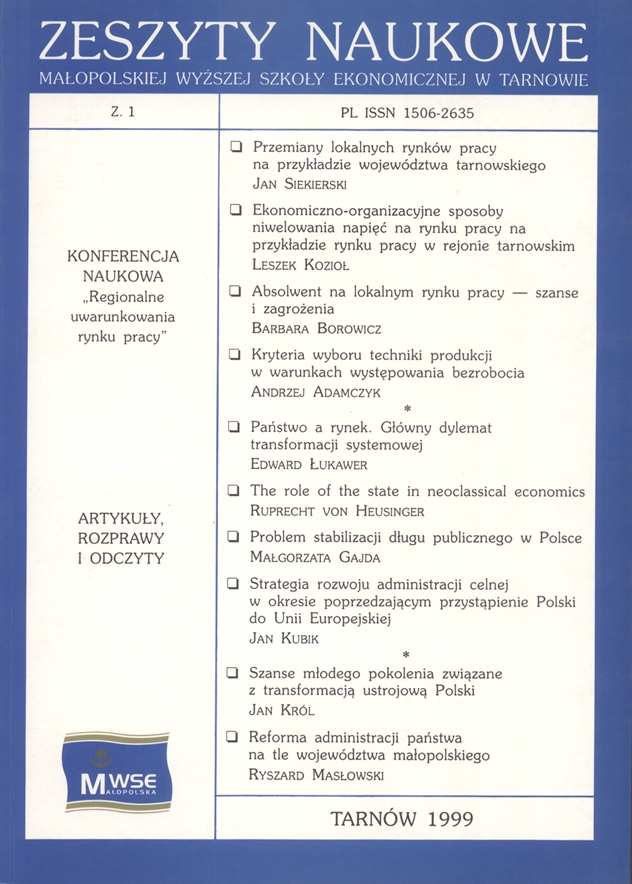Abstract
This paper entitled "Stabilisation problem of a public debt in Poland" analysis tendencies in managing the public loan in Poland, with particular respect to the period of 1990-1996. Since 1990 there has been a gradual restriction of NBP position as it comes to financing the budget deficit, until a complete prohibition of the deficit direct financing by the central bank became an entry in the Constitution of the Republic of Poland in 1997. Extension of time limits necessary for issuing treasury securities and increasing the flexibility of their turnover on the secondary market since the dematerialization of treasury bonds in 1995 is significant. This paper also analyses the factors, which in 1990-1996 affected the level of debt in an absolute depiction and in relation to GDP, as well as it shows some changes in the term structure of a public debt and tendencies of domestic and foreign debt participation in the total amount of public debt, as well as in relation to GDP. Participation of public debt service costs included in annual budget expenses and in GDP, has also been shown, the same as factors which let Poland fulfill the Maastricht Treaty Requirements in 1995-1996 – the level of public debt in relation to GDP did not generally exceeded 60% and the budget deficit in relation to GDP was 3% lower. The summary of the paper includes some recommendations on economy policy (especially fiscal one), which should contribute to solving a problem of future public debt growing, in order to limit its disadvantageous influence on economy and to conform Poland to the requirements established in this field by the European Union
References
Błaszczak A. , Jak sprzedać więcej obligacji?, „Rzeczpospolita” 1997, nr 225.
View in Google Scholar
Ciak J., Deficyt budżetowy – wybór czy konieczność?, „Bank i Kredyt” 1997, nr 4.
View in Google Scholar
Dziewulski P., Pieniędzy trzeba dobrze pilnować, „Rzeczpospolita” 1997, nr 67.
View in Google Scholar
Dziewulski P., Wskazana powściągliwość, „Gazeta Bankowa” 1996, nr 6.
View in Google Scholar
Dziewulski P., Radzewicz B., Dług publiczny – kierunki zmian w 1995 roku i oczekiwania na przyszłość, „Bank i Kredyt” 1996, nr 5.
View in Google Scholar
Gospodarka 1989—1996, „Nowe Życie Gospodarcze” 1997, nr 6.
View in Google Scholar
Kosterna U., Deficyt budżetu państwa i jego skutki ekonomiczne, Wydawnictwo Naukowe PWN, Warszawa 1995.
View in Google Scholar
Liczymy na banki, „Rzeczpospolita” 1996, nr 256.
View in Google Scholar
Niebezpieczne pływanie, „Gazeta Bankowa” 1997, nr 35.
View in Google Scholar
Nominalnie rósł, realnie malał, „Rzeczpospolita” 1996, nr 297.
View in Google Scholar
Owsiak S., Problem równowagi budżetowej w okresie transformacji gospodarki polskiej, „Bank i Kredyt” 1994, nr 1—2.
View in Google Scholar
Owsiak S., System finansów publicznych w procesie transformacji gospodarki polskiej, PWN, Warszawa 1995.
View in Google Scholar
Raporty o gospodarce, „Życie Gospodarcze” 1997, nr 9.
View in Google Scholar
Skarbowe Papiery Wartościowe — Raport roczny 1997, Ministerstwo Finansów 1997.
View in Google Scholar
Sprawozdanie z wykonania budżetu państwa, „Gazeta Bankowa” 1997, nr 30.
View in Google Scholar
Wykres tygodnia, „Gazeta Bankowa” 1997, nr 6.
View in Google Scholar
Załącznik do znowelizowanej ustawy budżetowej na 1997 rok.
View in Google Scholar
© Copyright by Małopolska School of Economics in Tarnów. The articles are available under the Creative Commons Attribution NonCommercial-NoDerivatives 4.0 International License


